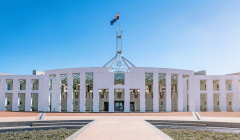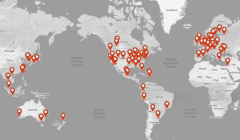Australia Passes Senate Bill to Combat Organ Harvesting in China

Australian Parliament, Canberra, Australia (Credit: Mlenny via Canva)
The Australian Senate passed a new bill on August 21, 2024, that aims to fight the illegal organ trafficking and forced organ harvesting from living people. The Migration Amendment (Overseas Organ Transplant Disclosure and Other Measures) Bill 2024 was first introduced by Liberal Senator Dean Smith in June 2023. It was submitted to Foreign Affairs, Defense and Trade Legislation Committee for review in November. The Senate held a public hearing on the Amendment on March 22, 2024.
This came after Cheng Peiming, a Falun Gong practitioner who survived the forcible removal of part of his liver and lung, came forward at a press conference in D.C. in August 2024 to tell his story. His compelling first hand account of the atrocities committed by the Chinese Communist Party demonstrates the wider pattern of state-sanctioned persecution and abuse.
The bill’s passage was made possible through gaining support from Liberal, National, Green senators and independent Senator David Pocock, and will now move to Australia’s House of Representatives for further debate.
The legislation amends the Migration Act of 1958 that requires people entering or returning to Australia by sea or air to disclose on the incoming passenger card whether they have received an organ transplant overseas in the last five years. This amendment aims to implement some of the recommendations from the Human Rights Sub-Committee’s 2018 report titled “Compassion, not Commerce: An Inquiry into Human Organ Trafficking and Organ Transplant Tourism.”
The amendment dictates that if responding affirmatively to the question of having received an organ transplant overseas in the last five years, those arriving in Australia will be asked to disclose which country, state, and locality they received the transplant and the name of the medical facility where the operation took place.
Senator Dean Smith said that “This is the most significant step made in decades in emboldening Australia’s efforts to combat the growing trade in illegal and unethical organ harvesting and trafficking, the information will be of great assistance to human rights organizations, medical institutions, and the Australian Government in analyzing data on trends in overseas transplants, and helping to corroborate existing evidence of organ trafficking or harvesting activities abroad.
“It will also serve to raise awareness of the sensitivity and risks associated with transplant tourism, encouraging Australian citizens and residents to consider whether any plans to receive an overseas operation might carry the risks associated with an unethical or unsafe organ transplant.”
The Greens supported the bill, with Greens Senator David Shoebridge saying that its passing would bring Australia in line with international efforts. However, the Labor Party opposed the bill, citing concerns that the policy would be ineffective in achieving the goal of eliminating the practice of forced organ harvesting.
Labor Party has maintained its stance against supporting the bill, citing that the existing laws already empower the migration minister and departmental delegates to cancel the visa of those who have character concerns and that people involved in organ trafficking are unlikely to provide truthful information when filling the passenger card upon arriving.
“As earlier, the government maintains its position that amending the incoming passenger card will be largely ineffectual, and the recipients and organisers are highly likely to conceal and fail to declare accurate information,” Senator Tim Ayres said.
While Labor opposes the bill, it acknowledges organ trafficking as a crime and a form of modern slavery.
In the process of the bill being passed, the story of Falun Gong practitioner Mr. Cheng Peiming, was widely reported by major media outlets in England, the U.S., and Australia. Mr. Cheng is the first victim found to have survived the Chinese Communist Party’s (CCP) systematic live organ harvesting and lived to tell the story. Last month he went to Washington D.C. to give a speech and recount his experience of what happened to him in China.
There has been speculation into the reasoning behind why Cheng’s abusers only partially removed his organs and allowed him to survive in 2004.
Wendy Rogers, advisory board chair of the International Coalition to End Transplant Abuse in China, noted that such liver tissue could have been given to a child patient, while David Matas, a human rights lawyer who has done extensive investigative research on the subject, suggests the hospital could have been experimenting or training doctors in the craft—the initial step of a hospital “getting into the business,” which yields massive profits, he told The Epoch Times.
Dr. Lucy Zhao, President of Falun Dafa Association in Australia, welcomed the new bill. She said the passing of the bill carries a special and important message, as this is the first legislative action taken by the Australia Parliament to curb illegal organ harvesting. During the debate, the senators brought the attention of live organ harvesting and the CCP’s persecution of Falun Gong and prisoners of conscience to the Congressional level.
Many countries passed similar bills, and Dr. Zhao hopes that the Australian government can go one step further and pass bills to punish offenders of illegal organ transplants, similar to what the U.K. and Canada have passed.









